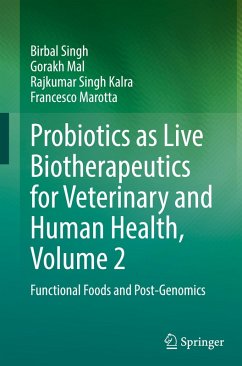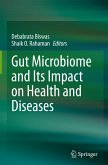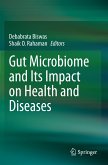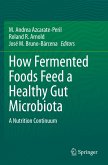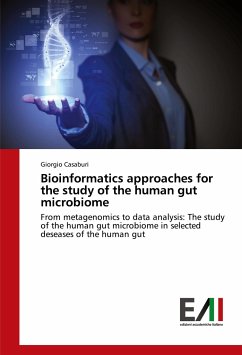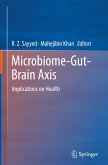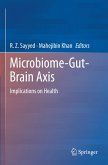Birbal Singh, Gorakh Mal, Rajkumar Singh Kalra
Probiotics as Live Biotherapeutics for Veterinary and Human Health, Volume 2
Functional Foods and Post-Genomics
Birbal Singh, Gorakh Mal, Rajkumar Singh Kalra
Probiotics as Live Biotherapeutics for Veterinary and Human Health, Volume 2
Functional Foods and Post-Genomics
- Gebundenes Buch
- Merkliste
- Auf die Merkliste
- Bewerten Bewerten
- Teilen
- Produkt teilen
- Produkterinnerung
- Produkterinnerung
This Volume 2 of a two-volume work provides an up-to-date overview of the latest advances in live biotherapeutics research, engineered and genome-edited probiotics. It focuses on key areas within probiotics and microbiome studies in human medicine, including their translation into commercial applications.
The book is divided into three sections, comprising (I) biomedical and nutritional benefits of probiotics for human health, (II) post-genomic technologies in probiotics sciences and genome engineering, and (III) biosafety aspects and prospects of biotherapeutics.
The broad spectrum of…mehr
Andere Kunden interessierten sich auch für
![Gut Microbiome and Its Impact on Health and Diseases Gut Microbiome and Its Impact on Health and Diseases]() Gut Microbiome and Its Impact on Health and DiseasesGut Microbiome and Its Impact on Health and Diseases139,99 €
Gut Microbiome and Its Impact on Health and DiseasesGut Microbiome and Its Impact on Health and Diseases139,99 €![Gut Microbiome and Its Impact on Health and Diseases Gut Microbiome and Its Impact on Health and Diseases]() Gut Microbiome and Its Impact on Health and Diseases139,99 €
Gut Microbiome and Its Impact on Health and Diseases139,99 €![How Fermented Foods Feed a Healthy Gut Microbiota How Fermented Foods Feed a Healthy Gut Microbiota]() How Fermented Foods Feed a Healthy Gut Microbiota116,99 €
How Fermented Foods Feed a Healthy Gut Microbiota116,99 €![Bioinformatics approaches for the study of the human gut microbiome Bioinformatics approaches for the study of the human gut microbiome]() Giorgio CasaburiBioinformatics approaches for the study of the human gut microbiome38,99 €
Giorgio CasaburiBioinformatics approaches for the study of the human gut microbiome38,99 €![Microbiome-Gut-Brain Axis Microbiome-Gut-Brain Axis]() Microbiome-Gut-Brain Axis139,99 €
Microbiome-Gut-Brain Axis139,99 €![Microbiome-Gut-Brain Axis Microbiome-Gut-Brain Axis]() Microbiome-Gut-Brain Axis93,99 €
Microbiome-Gut-Brain Axis93,99 €![Human Microbiome in Health, Disease, and Therapy Human Microbiome in Health, Disease, and Therapy]() Human Microbiome in Health, Disease, and Therapy123,99 €
Human Microbiome in Health, Disease, and Therapy123,99 €-
-
-
This Volume 2 of a two-volume work provides an up-to-date overview of the latest advances in live biotherapeutics research, engineered and genome-edited probiotics. It focuses on key areas within probiotics and microbiome studies in human medicine, including their translation into commercial applications.
The book is divided into three sections, comprising (I) biomedical and nutritional benefits of probiotics for human health, (II) post-genomic technologies in probiotics sciences and genome engineering, and (III) biosafety aspects and prospects of biotherapeutics.
The broad spectrum of industry-relevant contributions makes this work a valuable resource for industry professionals as well as researchers in functional food and feed biotechnology, applied microbiology and gastroenterology. Presenting novel and evidence-based research, this volume will drive the commercial enterprise and meets the great demand for good probiotic products in the human medical sector.
The book is divided into three sections, comprising (I) biomedical and nutritional benefits of probiotics for human health, (II) post-genomic technologies in probiotics sciences and genome engineering, and (III) biosafety aspects and prospects of biotherapeutics.
The broad spectrum of industry-relevant contributions makes this work a valuable resource for industry professionals as well as researchers in functional food and feed biotechnology, applied microbiology and gastroenterology. Presenting novel and evidence-based research, this volume will drive the commercial enterprise and meets the great demand for good probiotic products in the human medical sector.
Produktdetails
- Produktdetails
- Verlag: Springer / Springer Nature Switzerland / Springer, Berlin
- Artikelnr. des Verlages: 978-3-031-65458-9
- Seitenzahl: 848
- Erscheinungstermin: 12. November 2024
- Englisch
- Abmessung: 241mm x 160mm x 51mm
- Gewicht: 1363g
- ISBN-13: 9783031654589
- ISBN-10: 3031654587
- Artikelnr.: 70921072
- Herstellerkennzeichnung Die Herstellerinformationen sind derzeit nicht verfügbar.
- Verlag: Springer / Springer Nature Switzerland / Springer, Berlin
- Artikelnr. des Verlages: 978-3-031-65458-9
- Seitenzahl: 848
- Erscheinungstermin: 12. November 2024
- Englisch
- Abmessung: 241mm x 160mm x 51mm
- Gewicht: 1363g
- ISBN-13: 9783031654589
- ISBN-10: 3031654587
- Artikelnr.: 70921072
- Herstellerkennzeichnung Die Herstellerinformationen sind derzeit nicht verfügbar.
B. Singh, Ph. D., is Principal Scientist (Professor) at ICAR-Indian Veterinary Research Institute, Regional Station Palampur, India. He earned his Doctorate (Biotechnology) degree from ICAR-National Dairy Research Institute, India. Dr. Singh is one of the leading experts in the field of gut microbes and biotechnology. He has contributed to research and teaching at post graduate levels. His expertise includes biotechnology of gut microbiome, molecular biology and stem cell biology. He has published more than 100 research and review papers in peer reviewed journals, more than 100 research abstracts, technical bulletins, and authored two books, namely "Advances in Animal Biotechnology" (Springer Nature), and "Textbook of Animal Biotechnology" (TERI, New Delhi), and more than 25 chapters in books available by Elsevier, Springer, NOVA and others. He is reviewer for various international journals, and life member of assorted prestigious scientific bodies. G. Mal, Ph. D., is Head of the Station and Principal Scientist (Professor) at ICAR-Indian Veterinary Research Institute, Regional Station Palampur, India. He obtained his master's degree in Biochemistry from Chaudhary Sarwan Kumar Himachal Pradesh Agriculture University Palampur, India, and Ph. D. (Molecular Biology and Biotechnology) from University of Sheffield, South Yorkshire, U.K. Dr. G. Mal has expertise in molecular biology of cancer, gut microbiome, proteomics and biochemistry of milk. He has made outstanding contributions in research, teaching, extension and several institute building activities. He has published more than 120 scientific research papers and reviews, and more than 90 scientific abstracts in national and international journals. Dr. G. Mal has authored 4 books and contributed over 20 book chapters. He is reviewer for numerous prestigious international journals, and life member of various professional scientific societies. He has received several recognitions and took significant advances in the research during his tenure as Head of the Station. Rajkumar S. Kalra, Ph. D., attained a postgraduate program in Biotechnology at the CCS University Meerut, India. He obtained a Ph.D. in Biotechnology from the DBT-National Center for the Cell Science, Pune. Dr. Kalra pursued his postdoctoral training as a Japan Society for the Promotion of Science fellow at the Biomedical Research Institute, National Institute of Advanced Industrial Science & Technology, Japan. For a brief period, he joined BMRI, AIST as a Contract Research employee. In 2016, he later joined BMRI, AIST as an independent Young Investigator (Scientist, Staff). Since the late 2020, Dr. Kalra is pursuing his career as a Staff Scientist in the fields of immunity, cell biology, aging and wellbeing, and bioinformatics at the Okinawa Institute of Science and Technology Okinawa, Japan. Dr. Kalra is serving as associate editor for various international peer journals, and he has been a member of several international scientific societies. Prof. Francesco Marotta is a renowned Gastroenterologist. He earned M. D. degree and acquired specialization in Gastroenterology with highest ranking. He was Fellow in Gastroenterology at University of Chicago, and Clinical & Research Registrar in Gastroenterology at the GIT Department, University of Cape-Town, South Africa, where he worked on pancreatology. Prof. Marotta has been granted Fellowship by the Japanese Ministry of Science at the National Cancer Center, Tokyo. In Japan, he was Scientific Director for 10 years in private research lab performing studies on gut microbiota and functional foods. He has two international patents on nutraceuticals. Dr. Marotta was selected as Hon. Research Professor at Texas University, USA. He was Collaborating professor in nutragenomics at WHO Centre for Biotechnology and Traditional Medicine, University of Milano and visiting professor for gastroenterology, oxidative stress, aging and nutragenomics at major Asian universities. He is recipient of 17 international prizes, Genomic Pioneer Award in 2009 and Thomas Edison Award-2014 in the domain of Diabetes and Health. Dr. Marotta is an acknowledged invited speaker in USA, Europe, Asia and Middle East. He has published about 210 papers and over 10 book sections dealing with experimental and clinical gastroenterology, gut microbiota, nutraceuticals, oxidative stress and aging. He is founder of the EU-registered Research group ReGenera R&D International for Aging Intervention, Milano, Italy, dedicated to innovative models of predictive/preventive medicine. He is Editor of the book "Aging Gut Microbiota in Chronic Diseases" by Springer Nature.
Part 1: Biomedical and Nutritional Benefits of Probiotics for Human Health.- Chapter 1: Novel Insights into the Human Microbiome and its Functions.- Chapter 2: The Human Gut Microbiome as Source of Therapeutics.- Chapter 3: Probiotics in Pediatric and Neonate Health Care.- Chapter 4: Probiotics in Allergy Prevention.- Chapter 5: Probiotics in Oral Health Halitosis, Dental Caries and Periodontitis.- Chapter 6: Probiotics for Skin Health.- Chapter 7: Probiotics in Reproductive Health.- Chapter 8: Probiotics in Inflammatory Bowel Disease.- Chapter 9: Probiotic Therapies for Skeleton and Bone Health.- Chapter 10: Probiotics to Prevent Life-style and Metabolic Diseases.- Chapter 11: Probiotic Interventions in Cancer Prevention.- Chapter 12: Probiotics as Anti-aging Interventions.- Chapter 13: Non-conventional Therapies Against Drug-resistance.- Chapter 14: Probiotics Against Pulmonary Diseases.- Chapter 15: Gut-liver Axis Probiotic Interventions.- Chapter 16: Gut-brain Axis Probiotics as Psychobiotics.- Chapter 17: Anti-Parasitic Properties of Probiotics.- Chapter 18: Mobilizing Microbiota and Their Metabolites as Therapeutics.- Chapter 19: Probiotics and Synbiotics in Perioperative Treatments.- Chapter 20: Human Microbiome, Virome and Microbial Therapies Against COVID-19.- Part 2: Post-Genomic Technologies in Probiotics Sciences and Genome Engineering.- Chapter 21: Engineering Microbes for Health and Therapeutic Applications.- Chapter 22: Synthetic Biology Toolbox Developing Microbial Therapeutics.- Chapter 23: Synthetic Microbes to Modulate the Gut Ecosystem.- Chapter 24: Genetic Engineering and Genome-editing of Probiotic Microbes.- Chapter 25: Designer Probiotics and Postbiotics.- Chapter 26: Probiotics as Next Generation Mucosal Vaccine Vectors.- Chapter 27: Bacteriocins and Antimicrobial Peptides of Probiotics.- Chpater 28: Probiotics and Their Immunomodulatory Properties.- Chapter 29: Omics Technologies in Drug Discovery and Therapeutics.- Chapter 30: Proteomic Unraveling of Probiotics.- Chapter 31: Prediction of Gut Microbe-Host Interaction.- Chapter 32: Nutrigenomics, Metabolomics and Lipidomics in Probiotic Sciences.- Part 3: Biosafety Aspects and Future Prospects of Biotherapeutics.- Chapter 33: Evaluation of Probiotics and Safety Considerations.- Chapter 34: Guidelines for Use of Probiotics.- Chapter 35: Health Claims and Probiotic Recommendations.- Chapter 36: Fecal Microbiota Transplantation.
Part 1: Biomedical and Nutritional Benefits of Probiotics for Human Health.- Chapter 1: Novel Insights into the Human Microbiome and its Functions.- Chapter 2: The Human Gut Microbiome as Source of Therapeutics.- Chapter 3: Probiotics in Pediatric and Neonate Health Care.- Chapter 4: Probiotics in Allergy Prevention.- Chapter 5: Probiotics in Oral Health Halitosis, Dental Caries and Periodontitis.- Chapter 6: Probiotics for Skin Health.- Chapter 7: Probiotics in Reproductive Health.- Chapter 8: Probiotics in Inflammatory Bowel Disease.- Chapter 9: Probiotic Therapies for Skeleton and Bone Health.- Chapter 10: Probiotics to Prevent Life-style and Metabolic Diseases.- Chapter 11: Probiotic Interventions in Cancer Prevention.- Chapter 12: Probiotics as Anti-aging Interventions.- Chapter 13: Non-conventional Therapies Against Drug-resistance.- Chapter 14: Probiotics Against Pulmonary Diseases.- Chapter 15: Gut-liver Axis Probiotic Interventions.- Chapter 16: Gut-brain Axis Probiotics as Psychobiotics.- Chapter 17: Anti-Parasitic Properties of Probiotics.- Chapter 18: Mobilizing Microbiota and Their Metabolites as Therapeutics.- Chapter 19: Probiotics and Synbiotics in Perioperative Treatments.- Chapter 20: Human Microbiome, Virome and Microbial Therapies Against COVID-19.- Part 2: Post-Genomic Technologies in Probiotics Sciences and Genome Engineering.- Chapter 21: Engineering Microbes for Health and Therapeutic Applications.- Chapter 22: Synthetic Biology Toolbox Developing Microbial Therapeutics.- Chapter 23: Synthetic Microbes to Modulate the Gut Ecosystem.- Chapter 24: Genetic Engineering and Genome-editing of Probiotic Microbes.- Chapter 25: Designer Probiotics and Postbiotics.- Chapter 26: Probiotics as Next Generation Mucosal Vaccine Vectors.- Chapter 27: Bacteriocins and Antimicrobial Peptides of Probiotics.- Chpater 28: Probiotics and Their Immunomodulatory Properties.- Chapter 29: Omics Technologies in Drug Discovery and Therapeutics.- Chapter 30: Proteomic Unraveling of Probiotics.- Chapter 31: Prediction of Gut Microbe-Host Interaction.- Chapter 32: Nutrigenomics, Metabolomics and Lipidomics in Probiotic Sciences.- Part 3: Biosafety Aspects and Future Prospects of Biotherapeutics.- Chapter 33: Evaluation of Probiotics and Safety Considerations.- Chapter 34: Guidelines for Use of Probiotics.- Chapter 35: Health Claims and Probiotic Recommendations.- Chapter 36: Fecal Microbiota Transplantation.

